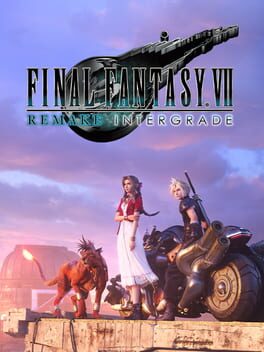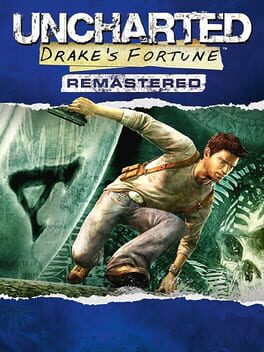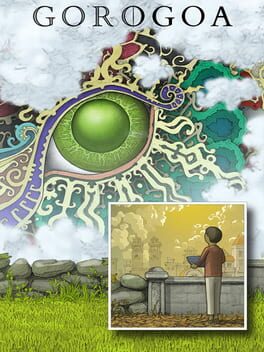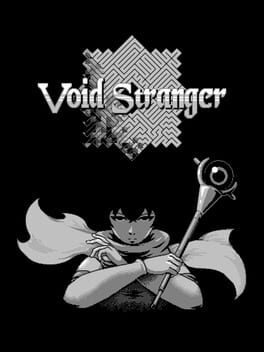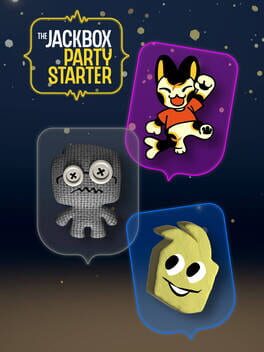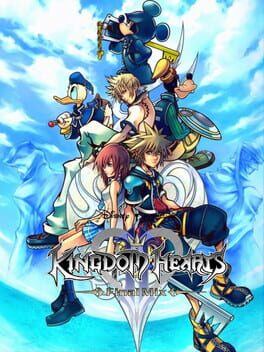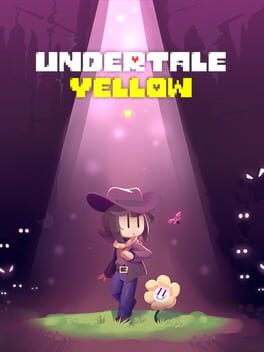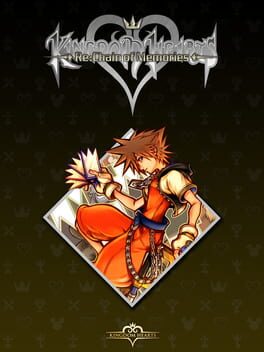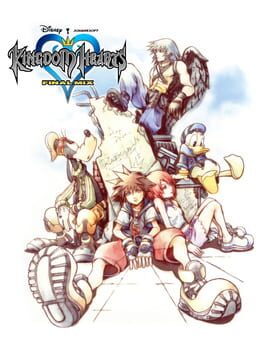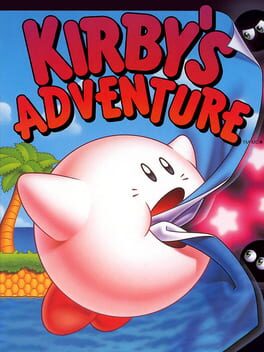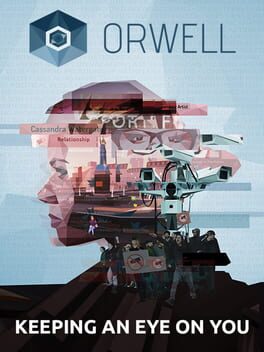AleF2050
[review wip]
People keep shitting on how this game is incredibly frustrating when Sekiro: Shadows Die Twice is a rarity that surprisingly has its own way of having an engaging combat gameplay that consists of an ACTUAL "parry and attack" procedure. For being a FromSoftware game, that carries on their legacy of developing their famous Action RPG game series Dark Souls, it is a wonderful game... IF you can manage to get through the game's very challenging patterns and solve problems in certain situations. Sekiro is NOT a game for those who are looking for a very accessible experience, this game requires you effort on finding your own reflexes, much like how would a shinobi perceive.
People keep shitting on how this game is incredibly frustrating when Sekiro: Shadows Die Twice is a rarity that surprisingly has its own way of having an engaging combat gameplay that consists of an ACTUAL "parry and attack" procedure. For being a FromSoftware game, that carries on their legacy of developing their famous Action RPG game series Dark Souls, it is a wonderful game... IF you can manage to get through the game's very challenging patterns and solve problems in certain situations. Sekiro is NOT a game for those who are looking for a very accessible experience, this game requires you effort on finding your own reflexes, much like how would a shinobi perceive.
This review contains spoilers
[still playing the game, and damn if it's that long, wip]
There's way lots to say for this "remake". Way lots.
Before i gave this a play i played through the original Final Fantasy VII for the PSX (PS4 version, which is a bit ugly) which was largely based upon (and later on the whole Compilation of FFVII created by the infamous Tetsuya Nomura), up to the point i gave up halfway during the 75% of Disc 1 and watched someone play the rest of it. It was a breakthrough hit for Squaresoft that was acclaimed by everyone and was known for having a modular Ability system known as Materia which allowed them to customize their own set of abilities and magic.
In the late 2010s, Nomura would be really purposeful to plan a trilogy of games that set in the main storyline of FFVII, starting with Remake (with Rebirth coming just after 4 years) which largely is compromised of the entire Midgar part, with further extensions and slight alterations. They apparently couldn't bother doing the Remake in one single entry so they decided to go on that direction, which apparently caused a questionable amount of fans that didn't like the way Squaresoft decided.
But what about how i felt about FF7 Remake? It's a remarkable experience. Not perfect, but just good enough. Problems? The English and Japanese dubs are VERY different in context which has caused quite a lot of confusion that, for example, the Italian subtitles match the Japanese translitteration. I've had encountered this problem since when i played the Live A Live remake. Apparently, it's quite a controversial decision from the localization team for being a Square Enix game. But anyway, let's cut it off.
The story of the game takes on a dramatic spin compared to the old Final Fantasy titles, with cinematic-style cutscenes taking the hurdle and extended plotlines all over the way. Parts of the rest of FFVII are taken and placed in Remake as well, including bits of soundtrack from the latter half of Disc 1 and familiar plot points such as Cloud's flashbacks. Taking in consideration this game heavily takes place inside Midgar, there is no actual overworld zone and the game mostly takes through a linear world progression (as of Chapter 11) with several small towns. Just like in FFVII, your party supports up to three playable characters and feature the famous Materia system, but the main difference is that combat is entirely redone with a different real-time battle system which replaces the necessity of having to use a separate battle scene, instead going for a more Chrono-esque immediate start and having the player control one of the three player characters, each one with their unique ability skillsets that can learn off from specific weapons they can obtain from shops. You can also upgrade your weapon's traits as well, allowing yourself to decide how you want to best suit your weapon's use at your discretion.
What i REALLY loved about this game, which unexpectedly hit me hard, is that the whole game's scoring is GODDAMN FUCKING great. I expected this game to be quite in the same quality as Final Fantasy XV but i'm utterly awe'd at the direction of this game, unlike how Nomura handled most of his games. Cutscenes, timing, the soundtrack variations (there's like so many rearrangements of Let The Battles Begin for example).
There's way lots to say for this "remake". Way lots.
Before i gave this a play i played through the original Final Fantasy VII for the PSX (PS4 version, which is a bit ugly) which was largely based upon (and later on the whole Compilation of FFVII created by the infamous Tetsuya Nomura), up to the point i gave up halfway during the 75% of Disc 1 and watched someone play the rest of it. It was a breakthrough hit for Squaresoft that was acclaimed by everyone and was known for having a modular Ability system known as Materia which allowed them to customize their own set of abilities and magic.
In the late 2010s, Nomura would be really purposeful to plan a trilogy of games that set in the main storyline of FFVII, starting with Remake (with Rebirth coming just after 4 years) which largely is compromised of the entire Midgar part, with further extensions and slight alterations. They apparently couldn't bother doing the Remake in one single entry so they decided to go on that direction, which apparently caused a questionable amount of fans that didn't like the way Squaresoft decided.
But what about how i felt about FF7 Remake? It's a remarkable experience. Not perfect, but just good enough. Problems? The English and Japanese dubs are VERY different in context which has caused quite a lot of confusion that, for example, the Italian subtitles match the Japanese translitteration. I've had encountered this problem since when i played the Live A Live remake. Apparently, it's quite a controversial decision from the localization team for being a Square Enix game. But anyway, let's cut it off.
The story of the game takes on a dramatic spin compared to the old Final Fantasy titles, with cinematic-style cutscenes taking the hurdle and extended plotlines all over the way. Parts of the rest of FFVII are taken and placed in Remake as well, including bits of soundtrack from the latter half of Disc 1 and familiar plot points such as Cloud's flashbacks. Taking in consideration this game heavily takes place inside Midgar, there is no actual overworld zone and the game mostly takes through a linear world progression (as of Chapter 11) with several small towns. Just like in FFVII, your party supports up to three playable characters and feature the famous Materia system, but the main difference is that combat is entirely redone with a different real-time battle system which replaces the necessity of having to use a separate battle scene, instead going for a more Chrono-esque immediate start and having the player control one of the three player characters, each one with their unique ability skillsets that can learn off from specific weapons they can obtain from shops. You can also upgrade your weapon's traits as well, allowing yourself to decide how you want to best suit your weapon's use at your discretion.
What i REALLY loved about this game, which unexpectedly hit me hard, is that the whole game's scoring is GODDAMN FUCKING great. I expected this game to be quite in the same quality as Final Fantasy XV but i'm utterly awe'd at the direction of this game, unlike how Nomura handled most of his games. Cutscenes, timing, the soundtrack variations (there's like so many rearrangements of Let The Battles Begin for example).
Played this jolly good game during the period when i first bought the PlayStation 4 in a time when the PlayStation 5 was about to come.
I'm not that great with videogames and movies that tell stories about exploring forbidden ruins, such as Tomb Raider and Indiana Jones franchises, although this was a great experience for the first time i played it when during the COVID-19 pandemic Sony gave away the Uncharted collection for free. This game was developed by the folks behind the original Crash Bandicoot series before they sold it to Activision, although there's nothing really anything interesting to note about this.
As far as i could remember, the game tells the journey of Nathan Drake who searches for the treasure of El Dorado following the diaries of Francis Drake, only to be surrounded by many adversaries who seem to go after him or the treasure. The main thing of this game is that the progression switches between exploration and combat parts constantly as you delve into mysterious locations such as temples, abandoned castles and cities, alongside solving interesting puzzles, before getting into combat scenes involving loan sharks and other enemies that Drake encounters.
The first game had a twist that kind of thrilled me when they put off that archeological haunting atmosphere decently, but i appreciated the twist of the second game more than this one, but the first Uncharted never ceases to be amazing.
In the collection, there's also extra secrets that however i do not ever intend to go seeking for because of obvious completionist stuff i don't care about getting into.
I'm not that great with videogames and movies that tell stories about exploring forbidden ruins, such as Tomb Raider and Indiana Jones franchises, although this was a great experience for the first time i played it when during the COVID-19 pandemic Sony gave away the Uncharted collection for free. This game was developed by the folks behind the original Crash Bandicoot series before they sold it to Activision, although there's nothing really anything interesting to note about this.
As far as i could remember, the game tells the journey of Nathan Drake who searches for the treasure of El Dorado following the diaries of Francis Drake, only to be surrounded by many adversaries who seem to go after him or the treasure. The main thing of this game is that the progression switches between exploration and combat parts constantly as you delve into mysterious locations such as temples, abandoned castles and cities, alongside solving interesting puzzles, before getting into combat scenes involving loan sharks and other enemies that Drake encounters.
The first game had a twist that kind of thrilled me when they put off that archeological haunting atmosphere decently, but i appreciated the twist of the second game more than this one, but the first Uncharted never ceases to be amazing.
In the collection, there's also extra secrets that however i do not ever intend to go seeking for because of obvious completionist stuff i don't care about getting into.
To be honest, i NEVER played a Silent Hill game and therefore i'm quite of an ignorant when it comes to my knowledge of the franchise. I was terribly curious of how this game was THAT darn panned so i decided to give it a try.
The game's performance, even on a PS5, is terribly unoptimized, first of all, and there is no option of using a Performance option, but the graphics might not be the problem at all. The story, even towards the end, manages to be really confusing that it only solves with the usual, repeated message about suicide prevention.
I just feel like they tried their own best to bring back a beloved franchise, but then, there's yet to wait for Silent Hill f in this case...
The game's performance, even on a PS5, is terribly unoptimized, first of all, and there is no option of using a Performance option, but the graphics might not be the problem at all. The story, even towards the end, manages to be really confusing that it only solves with the usual, repeated message about suicide prevention.
I just feel like they tried their own best to bring back a beloved franchise, but then, there's yet to wait for Silent Hill f in this case...
2017
2023
This review contains spoilers
This is a recent oddity in the indie game scene, albeit very underrated, BUT the amount of content is surprisingly a lot than you'd ever believe. Made by the same dudes behind ZeroRanger, the yet spiteful Void Stranger takes you into a desperate ride inside the titular Void where you have to solve countless puzzles as you try to relive your memories... sort of.
However, whatever you do have interesting ways of pushing you back. The game has the ability to talk you back and the way it does is surprisingly done well. You don't get direct help, but through use of mechanics, trial and error is an essential way to get through the dangers of the void. In particular, let's talk, for example, the use of the Locusts... and the VOIDED mechanic that is introduced if you happen to die and lose all locusts. What does it tell to you?
Hmmm, interesting.
During my first run, being VOIDED only permits you to experience the game's main loop with unlimited retries, although you get a bad ending that loops you back to the beginning, resetting you back to uh... HP07. Yeah, don't ask me why it's HP07. Then, the Locusts... they are meant to be the "lives" counter. I won't talk quite much about it because Void Stranger is REALLY something that Toby Fox would ever do if he'd ever work on a puzzle game, but this game is done under the hands of really magnificent Finnish developers.
But as i kept playing, i noticed how much deep the puzzle exploration value goes, and apparently it's not done in a rather accessible way. Unfortunately, i had to partly spoiler the game for me because it is VERY easy to get lost and not knowing what to do with the game, due to its nature on relying the secret over the secret. The reason why i'm not giving 5 stars for it is that this game really tends to put your head into solving things even in the most meta way possible and its tendency of tricking you many times, not just sokoban styled puzzles, but also implementing different riddles and subpuzzles that go beyond the main gameplay. If you're not a hardcore fan of puzzles, i probably would say, spoiling partly would just be your last resort, because, sadly, Void Stranger is not a game for everyone.
So i'm just giving out 4 stars because, while it has an excellent soundtrack, graphics and a interesting choice of dialogues, the gameplay quite puts you a lot of trouble and frustration at times if you're not careful with what you're playing at, and myself can't really bother losing my head over puzzles on puzzles all over.
However, whatever you do have interesting ways of pushing you back. The game has the ability to talk you back and the way it does is surprisingly done well. You don't get direct help, but through use of mechanics, trial and error is an essential way to get through the dangers of the void. In particular, let's talk, for example, the use of the Locusts... and the VOIDED mechanic that is introduced if you happen to die and lose all locusts. What does it tell to you?
Hmmm, interesting.
During my first run, being VOIDED only permits you to experience the game's main loop with unlimited retries, although you get a bad ending that loops you back to the beginning, resetting you back to uh... HP07. Yeah, don't ask me why it's HP07. Then, the Locusts... they are meant to be the "lives" counter. I won't talk quite much about it because Void Stranger is REALLY something that Toby Fox would ever do if he'd ever work on a puzzle game, but this game is done under the hands of really magnificent Finnish developers.
But as i kept playing, i noticed how much deep the puzzle exploration value goes, and apparently it's not done in a rather accessible way. Unfortunately, i had to partly spoiler the game for me because it is VERY easy to get lost and not knowing what to do with the game, due to its nature on relying the secret over the secret. The reason why i'm not giving 5 stars for it is that this game really tends to put your head into solving things even in the most meta way possible and its tendency of tricking you many times, not just sokoban styled puzzles, but also implementing different riddles and subpuzzles that go beyond the main gameplay. If you're not a hardcore fan of puzzles, i probably would say, spoiling partly would just be your last resort, because, sadly, Void Stranger is not a game for everyone.
So i'm just giving out 4 stars because, while it has an excellent soundtrack, graphics and a interesting choice of dialogues, the gameplay quite puts you a lot of trouble and frustration at times if you're not careful with what you're playing at, and myself can't really bother losing my head over puzzles on puzzles all over.
[review wip, will give a rating later]
[Ok, first of all, long premise about Jackbox Games and how they came to glory with streamed party games.]
I've been eagerly wanting to play this a bit often alongside the other Jackbox party games ever since i've been recently getting into it thanks to a fellow Twitch streamer friend of mine who's got a small but pretty active userbase. I used to hear about You Don't Know Jack, Jackbox Games' titular flagship trivia game which made the company famous which also got numerous editions since 1995 up until its last standalone edition in 2013. With the popularity of mobile games uprising during 2008, Jackbox Games went on to create a mobile version of their trivia game You Don't Know Jack for iOS, and then a Facebook game version during the early 2010s. The company was known for that trivia game at that time, but something was running amok when in 2013 the Roku TV and Ouya were around, and Jackbox Games went on to experiment with other kind of 'social' games such as Clone Booth and Lie Swatter, but these titles weren't the ones that led the company towards a new direction.
It was September 2014, when Jackbox Games published Fibbage, a party bluffing game which got a huge success thanks to its unique lobby code driven multiplayer gameplay which allowed spectator play with streaming services like Twitch. From there, in the next following month, the success led the company to create what would be their new flagship game series called The Jackbox Party Pack, with the first pack including Drawful, Fibbage XL (the extended edition of Fibbage), Lie Swatter, Word Spud and the 2015 edition of You Don't Know Jack. The company would release these games not just on computer devices but also console platforms for finding more audience in any other place. And with that, each year Jackbox Games would release a new pack with quite varied party games.
This franchise was really quite known among American audiences, but later during the COVID-19 pandemic, the franchise got European language localization starting from the 2020 re-edition of Quiplash 2, which was a sequel to one of Jackbox's most picked party games. It was a point of revolution for the company which led to a huge surge of popularity around the late period of 2020 (and competed alongside other party games such as Gartic Phone, a free online game inspired from Pictionary) which lasted for nearly a year before nearly gathering nearly a thousand of average viewers in Twitch streams nowadays.
Jackbox Party Starter came along around 2022 which brought back three of the company's previously enlisted games, the ever hilarious Tee K.O. where you draw drawings and them associate them with quirky sentences or words, Trivia Murder Party 2 (not a fan of trivia games, honestly) which is a bit of trivia with some minigames placed in when you fail a trivia question (and i think that's where the actual fun comes in) and lastly the third edition of Quiplash. As a person who is mostly lonely in my free time, there's hardly ever someone like me who would set up a conference room where we could play these kind of interactive whiteboard party games, unfortunately, back then in my high school didn't take advantage of these amazing (although some of Jackbox's games aren't that best sometimes) crafted party videogames considering they DO have a pricing, but once you get to buy them, you will be able to save people's lives by enjoying these never-seen before party games, stuff that Hasbro wouldn't ever make it to the top.
After this long explanation of how the glory of Jackbox Games brought insane party fun with the power of adult jokes and shenanigans, it is about time i'd finally get to actually review the games, at least in their Party Starter version:
- Tee K.O.: I'm starting with this first because this game is one of the most appreciated party games. Tee K.O. gets you in the middle of a competition where you have to create a shirt that stands out among all the other shirts by creating a series of drawings and slogans that go together to create the shirt of your dreams. Up to 8 players can create up to 24 drawings that then are randomly picked, then the amount of slogans can be as plenty as you can. The crucial part of each round (1 & 3) is when you get to create the shirt which most of the time depending on the party group will come up with unique and smart captioned tshirts, and it really works. IT REALLY WORKS. In Round 2 & 4, the T shirts duke it out to see who's the best, but the tshirts are ordered randomly, allowing for a more improvised voting experience. The final round has you duke out against the remaining t-shirts before placing in first place. Aside from the shirts, players can gain points depending whenever they provide their own drawings and slogans, but also for creating their own shirts. This game is really plenty of fun that it got its own place here in the Party Starter Pack, aside from the fact Tee K.O. 2 only got a better drawing editor BUT with a slightly different shirt sorting.
[Ok, first of all, long premise about Jackbox Games and how they came to glory with streamed party games.]
I've been eagerly wanting to play this a bit often alongside the other Jackbox party games ever since i've been recently getting into it thanks to a fellow Twitch streamer friend of mine who's got a small but pretty active userbase. I used to hear about You Don't Know Jack, Jackbox Games' titular flagship trivia game which made the company famous which also got numerous editions since 1995 up until its last standalone edition in 2013. With the popularity of mobile games uprising during 2008, Jackbox Games went on to create a mobile version of their trivia game You Don't Know Jack for iOS, and then a Facebook game version during the early 2010s. The company was known for that trivia game at that time, but something was running amok when in 2013 the Roku TV and Ouya were around, and Jackbox Games went on to experiment with other kind of 'social' games such as Clone Booth and Lie Swatter, but these titles weren't the ones that led the company towards a new direction.
It was September 2014, when Jackbox Games published Fibbage, a party bluffing game which got a huge success thanks to its unique lobby code driven multiplayer gameplay which allowed spectator play with streaming services like Twitch. From there, in the next following month, the success led the company to create what would be their new flagship game series called The Jackbox Party Pack, with the first pack including Drawful, Fibbage XL (the extended edition of Fibbage), Lie Swatter, Word Spud and the 2015 edition of You Don't Know Jack. The company would release these games not just on computer devices but also console platforms for finding more audience in any other place. And with that, each year Jackbox Games would release a new pack with quite varied party games.
This franchise was really quite known among American audiences, but later during the COVID-19 pandemic, the franchise got European language localization starting from the 2020 re-edition of Quiplash 2, which was a sequel to one of Jackbox's most picked party games. It was a point of revolution for the company which led to a huge surge of popularity around the late period of 2020 (and competed alongside other party games such as Gartic Phone, a free online game inspired from Pictionary) which lasted for nearly a year before nearly gathering nearly a thousand of average viewers in Twitch streams nowadays.
Jackbox Party Starter came along around 2022 which brought back three of the company's previously enlisted games, the ever hilarious Tee K.O. where you draw drawings and them associate them with quirky sentences or words, Trivia Murder Party 2 (not a fan of trivia games, honestly) which is a bit of trivia with some minigames placed in when you fail a trivia question (and i think that's where the actual fun comes in) and lastly the third edition of Quiplash. As a person who is mostly lonely in my free time, there's hardly ever someone like me who would set up a conference room where we could play these kind of interactive whiteboard party games, unfortunately, back then in my high school didn't take advantage of these amazing (although some of Jackbox's games aren't that best sometimes) crafted party videogames considering they DO have a pricing, but once you get to buy them, you will be able to save people's lives by enjoying these never-seen before party games, stuff that Hasbro wouldn't ever make it to the top.
After this long explanation of how the glory of Jackbox Games brought insane party fun with the power of adult jokes and shenanigans, it is about time i'd finally get to actually review the games, at least in their Party Starter version:
- Tee K.O.: I'm starting with this first because this game is one of the most appreciated party games. Tee K.O. gets you in the middle of a competition where you have to create a shirt that stands out among all the other shirts by creating a series of drawings and slogans that go together to create the shirt of your dreams. Up to 8 players can create up to 24 drawings that then are randomly picked, then the amount of slogans can be as plenty as you can. The crucial part of each round (1 & 3) is when you get to create the shirt which most of the time depending on the party group will come up with unique and smart captioned tshirts, and it really works. IT REALLY WORKS. In Round 2 & 4, the T shirts duke it out to see who's the best, but the tshirts are ordered randomly, allowing for a more improvised voting experience. The final round has you duke out against the remaining t-shirts before placing in first place. Aside from the shirts, players can gain points depending whenever they provide their own drawings and slogans, but also for creating their own shirts. This game is really plenty of fun that it got its own place here in the Party Starter Pack, aside from the fact Tee K.O. 2 only got a better drawing editor BUT with a slightly different shirt sorting.
2015
This review contains spoilers
I highly RECOMMEND reading this review after you've beaten at least one run, or probably worth two different runs (or even all, there's so much to play), because this game has SO MUCH to offer.
GO PLAY IT.
NOW.
Or well... if you say so, you can just read this review...
...but you might know what you don't want to know! Hahahahahahaha!
Ok, here it goes.
( Feeling inspired to read this review gives you determination. )
One of the most wonderful indie games ever done that surprisingly manages to go beyond the RPG genre and make it a meta.
And it is made by a music composer who started learning GameMaker after learning about arrays.
Seriously.
The game started out as "UnderBound 2", sequel to a non-existing game of the same title and was originally introduced in the Starmen.net forums (a popular EarthBound fanbase forums, also a home to the famous Mother 3 fantranslation), although nowadays its original thread has been deleted by Toby Fox after the huge (unexpected) success.
It is meant to be a tribute to the JRPG game genre as a whole and features an incredibly crafted story and gameplay that deconstructs it. You're introduced to a quite atypical JRPG world where humans and monsters have fought against themselves, only for the humans to have won the war and seal the monsters inside the underground. The very first minutes of the game seem quite innocent, but then as you work through your first run, you may don't realize quite soon that you're missing something, that the world you've been exploring and diving into may not seem as bad than you'd think.
As you move through, you can partake the usual JRPG grindfest or basically engage with friendly actions towards monsters you encounter in your path. But the battle system is where the actual fun begins. You don't basically just press a button and smash the enemy, but when the enemy attacks you, you are presented with a bullet hell dodging pattern where your SOUL (a heart shaped hitbox) has to dodge white shaped projectiles on a white cornered box. Sometimes certain battle encounters go beyond their scope. Whenever the game puts judgement on you depends on your actions as there are quite a number of different endings you can achieve. The main ones are 3, the Neutral, Pacifist and Genocide routes, which alter significantly the whole game and provide a different experience.
And it brutally works.
We talk about how the final bosses have their own story to tell, such as Asgore and how he intends to break the barrier by taking your SOUL, only for Flowey to come and ruin the scene and get you to fight him as he transforms into a mess of photomashed parts that completely breaks the limits of the game's overall art style (after all, i'd consider Undertale an 'art' game because of this and the fact that art and sound styles tend to clash each other, but done in a well intented manner).
Then...
[SPOILERS FOR GENOCIDE RUN BELOW]
[ YEAH ]
[ * I WARNED YOU ]
Then there's a particular skeleton who goes against you, for being a maniac killer who has nearly killed the whole underground. And the boss fight is the most hardest of all the game, intended to push the player at a difficulty curve and urging you to "give up". The game basically mocks you, but let me tell you what, if you're a player who is well intent on trial-and-error gameplay, the final boss of the Genocide Route may be quite good stuff for you and unironically IS THE BEST BOSS FIGHTS OF THE GAME after Flowey.
( Papyrus: HOWDY THERE, HUMAN! IF YOU'VE READ THIS REVIEW HERE WITHOUT CONSIDERING TO PLAY UNDERTALE, HAVE YOU THOUGHT THAT IT WAS QUITE A SHAME FOR YOU TO HAVE ANTICIPATED DETAILS OF WHAT IS TO COME? NYEH HEH HEH HEH HEH HEH! )
( sans: eh, too bad... because the game's quite good. is it 29,99 dollars? no, it's just affordable at a good price. really good price, i say. could it be 19,99 dollars? no. let's make it 9,99 dollars, at least. )
( Papyrus: BUT WHY NOT MAKE IT 1,99? )
( sans: uhh... we don't want it to feel like a barebones game. )
( sans: make sure to not become a cluster of trouble for us, okay? )
( sans: or i shall break your clock. )
GO PLAY IT.
NOW.
Or well... if you say so, you can just read this review...
...but you might know what you don't want to know! Hahahahahahaha!
Ok, here it goes.
( Feeling inspired to read this review gives you determination. )
One of the most wonderful indie games ever done that surprisingly manages to go beyond the RPG genre and make it a meta.
And it is made by a music composer who started learning GameMaker after learning about arrays.
Seriously.
The game started out as "UnderBound 2", sequel to a non-existing game of the same title and was originally introduced in the Starmen.net forums (a popular EarthBound fanbase forums, also a home to the famous Mother 3 fantranslation), although nowadays its original thread has been deleted by Toby Fox after the huge (unexpected) success.
It is meant to be a tribute to the JRPG game genre as a whole and features an incredibly crafted story and gameplay that deconstructs it. You're introduced to a quite atypical JRPG world where humans and monsters have fought against themselves, only for the humans to have won the war and seal the monsters inside the underground. The very first minutes of the game seem quite innocent, but then as you work through your first run, you may don't realize quite soon that you're missing something, that the world you've been exploring and diving into may not seem as bad than you'd think.
As you move through, you can partake the usual JRPG grindfest or basically engage with friendly actions towards monsters you encounter in your path. But the battle system is where the actual fun begins. You don't basically just press a button and smash the enemy, but when the enemy attacks you, you are presented with a bullet hell dodging pattern where your SOUL (a heart shaped hitbox) has to dodge white shaped projectiles on a white cornered box. Sometimes certain battle encounters go beyond their scope. Whenever the game puts judgement on you depends on your actions as there are quite a number of different endings you can achieve. The main ones are 3, the Neutral, Pacifist and Genocide routes, which alter significantly the whole game and provide a different experience.
And it brutally works.
We talk about how the final bosses have their own story to tell, such as Asgore and how he intends to break the barrier by taking your SOUL, only for Flowey to come and ruin the scene and get you to fight him as he transforms into a mess of photomashed parts that completely breaks the limits of the game's overall art style (after all, i'd consider Undertale an 'art' game because of this and the fact that art and sound styles tend to clash each other, but done in a well intented manner).
Then...
[SPOILERS FOR GENOCIDE RUN BELOW]
[ YEAH ]
[ * I WARNED YOU ]
Then there's a particular skeleton who goes against you, for being a maniac killer who has nearly killed the whole underground. And the boss fight is the most hardest of all the game, intended to push the player at a difficulty curve and urging you to "give up". The game basically mocks you, but let me tell you what, if you're a player who is well intent on trial-and-error gameplay, the final boss of the Genocide Route may be quite good stuff for you and unironically IS THE BEST BOSS FIGHTS OF THE GAME after Flowey.
( Papyrus: HOWDY THERE, HUMAN! IF YOU'VE READ THIS REVIEW HERE WITHOUT CONSIDERING TO PLAY UNDERTALE, HAVE YOU THOUGHT THAT IT WAS QUITE A SHAME FOR YOU TO HAVE ANTICIPATED DETAILS OF WHAT IS TO COME? NYEH HEH HEH HEH HEH HEH! )
( sans: eh, too bad... because the game's quite good. is it 29,99 dollars? no, it's just affordable at a good price. really good price, i say. could it be 19,99 dollars? no. let's make it 9,99 dollars, at least. )
( Papyrus: BUT WHY NOT MAKE IT 1,99? )
( sans: uhh... we don't want it to feel like a barebones game. )
( sans: make sure to not become a cluster of trouble for us, okay? )
( sans: or i shall break your clock. )
[review wip]
Kingdom Hearts 1 was a good start, even if towards the end the difficulty began to feel like HELL. Then there was Chain of Memories, which was an absolutely weird sequel considering how its design wasn't that good to appeal to JRPG players. And then there's this. Kingdom Hearts 2, in my opinion, feels better to play around than the first game, as it successfully improves the gameplay and adds in several mechanics which enhances the player experience.
Kingdom Hearts 1 was a good start, even if towards the end the difficulty began to feel like HELL. Then there was Chain of Memories, which was an absolutely weird sequel considering how its design wasn't that good to appeal to JRPG players. And then there's this. Kingdom Hearts 2, in my opinion, feels better to play around than the first game, as it successfully improves the gameplay and adds in several mechanics which enhances the player experience.
2023
This review contains spoilers
[review wip]
First Undertale fangame i ever cared for and been playing it to do all the three routes. Most Undertale fangames tend to be rehashed versions of the original Undertale, except with swapped personalities, for example, that tend to be ridiculous at times (and most of the time, by my words, ruin the original character's purpose). Undertale's plot is very hard to be as consistent as possible and trying to fully understand it in order to adapt it in different contextes can take a LOT of time.
This one, however, manages to excel the impossible, for taking so long (7 years) to finish while Undertale was pretty strong, with a collaborative team effort compared to Toby Fox and Temmie Chang (and guests)'s creative powers, but it does not however manage to be as hilarious as the original, due to the fact that Undertale Yellow is a side story rather than a proper journey and features a more serious mood which is noted by the lack of amount of internet and pop culture references. But hey, there are few jokes that work, actually.
But also that means that you won't actually be seeing the same Undertale characters you've been used to. Sans, Papyrus, Napstablook, Undyne, Mettaton, Alphys, all the memorable cast. Instead, you are on an earlier version of the whole underground featuring a different cast of original characters, and apparently they gained a fandom popularity, especially with Ceroba. Sorry, had to mention it earlier. I really like her, too.
The amount of detail in which Undertale's main gameplay is recreated in this fangame is done at a nearly precise manner, albeit few gameplay differences are introduced here such as a different FIGHT which consists of a circular input timing rather than a horizontal bar, which shapes up the 6 barrels of a revolver, much as how the horizontal bar represents the swinging of a knife. The enemy animation, done differently, has a more refreshened kind of animation and is indoubtly quite superior compared to most monster animation and sprites in Undertale (but anyways, the quality doesn't matter at all), albeit the fight against the Feisty Five has the best animations you would ever see in a fangame.
First Undertale fangame i ever cared for and been playing it to do all the three routes. Most Undertale fangames tend to be rehashed versions of the original Undertale, except with swapped personalities, for example, that tend to be ridiculous at times (and most of the time, by my words, ruin the original character's purpose). Undertale's plot is very hard to be as consistent as possible and trying to fully understand it in order to adapt it in different contextes can take a LOT of time.
This one, however, manages to excel the impossible, for taking so long (7 years) to finish while Undertale was pretty strong, with a collaborative team effort compared to Toby Fox and Temmie Chang (and guests)'s creative powers, but it does not however manage to be as hilarious as the original, due to the fact that Undertale Yellow is a side story rather than a proper journey and features a more serious mood which is noted by the lack of amount of internet and pop culture references. But hey, there are few jokes that work, actually.
But also that means that you won't actually be seeing the same Undertale characters you've been used to. Sans, Papyrus, Napstablook, Undyne, Mettaton, Alphys, all the memorable cast. Instead, you are on an earlier version of the whole underground featuring a different cast of original characters, and apparently they gained a fandom popularity, especially with Ceroba. Sorry, had to mention it earlier. I really like her, too.
The amount of detail in which Undertale's main gameplay is recreated in this fangame is done at a nearly precise manner, albeit few gameplay differences are introduced here such as a different FIGHT which consists of a circular input timing rather than a horizontal bar, which shapes up the 6 barrels of a revolver, much as how the horizontal bar represents the swinging of a knife. The enemy animation, done differently, has a more refreshened kind of animation and is indoubtly quite superior compared to most monster animation and sprites in Undertale (but anyways, the quality doesn't matter at all), albeit the fight against the Feisty Five has the best animations you would ever see in a fangame.
This review contains spoilers
Probably one of the most weirdest game designs conceptualized for a JRPG franchise, with expectable flaws. This is, after all, another Kingdom Hearts game and a sequel to the first mainline game. Sora, Goofy and Donald arrive at a strange castle located in the top of some hill which leads them to a single way journey to find Riku and Mickey, except that their memories are to be influenced by the mysterious, yet mind distorting Castle Oblivion.
So where do we start? The gameplay distances away from the traditional Action RPG approach that was found in Kingdom Hearts (Final Mix) and turns it into a real-time card game where every action, item, abilities, spells, summons, etc. become literal cards (which are also a thing in the story). General progression consists of exploring areas which are mainly composed of Room Cards that depict how a room is created (with varying room layouts depending on each world) and gaining experience from enemy encounters which are separatedly taken place in a square room rather than directly on map. Unfortunately, the problems in this game may ruin expectations of playing this title, i'll give in some key ones:
The battle system, most of all, is a mechanical variation of the Kingdom Hearts action battle system, with the exception of actions being materialized as cards. The cards in battle have a numeration from 0 to 9, which means that you have to use cards and counter any enemy ones that are HIGHER (as in, NOT EQUAL OR HIGHER) than your number used, although you can utilize combo cards which however have to take THREE of your deck to do so.
But ultimately, i had to give up to this game because i figured out that its gameplay is totally different, and that its card game design is so messy that i wasn't able to easily get through tougher bosses that goes from Hollow Bastion and onwards. Yeah no. I really had enough. I just decided i'd just screw it and moved on KH2.
At least, you can watch the cutscenes on YouTube if you can, as apparently KH:COM introduces Organization XIII.
So where do we start? The gameplay distances away from the traditional Action RPG approach that was found in Kingdom Hearts (Final Mix) and turns it into a real-time card game where every action, item, abilities, spells, summons, etc. become literal cards (which are also a thing in the story). General progression consists of exploring areas which are mainly composed of Room Cards that depict how a room is created (with varying room layouts depending on each world) and gaining experience from enemy encounters which are separatedly taken place in a square room rather than directly on map. Unfortunately, the problems in this game may ruin expectations of playing this title, i'll give in some key ones:
The battle system, most of all, is a mechanical variation of the Kingdom Hearts action battle system, with the exception of actions being materialized as cards. The cards in battle have a numeration from 0 to 9, which means that you have to use cards and counter any enemy ones that are HIGHER (as in, NOT EQUAL OR HIGHER) than your number used, although you can utilize combo cards which however have to take THREE of your deck to do so.
But ultimately, i had to give up to this game because i figured out that its gameplay is totally different, and that its card game design is so messy that i wasn't able to easily get through tougher bosses that goes from Hollow Bastion and onwards. Yeah no. I really had enough. I just decided i'd just screw it and moved on KH2.
At least, you can watch the cutscenes on YouTube if you can, as apparently KH:COM introduces Organization XIII.
(review wip)
KHFM1.5+2.5 version for PS4 (and compatible with PS5).
I don't regret starting this franchise (or so i thought) but there were definitely some oddities that, for a PS2 title, gave this title a little headache for me to get through.
I'd go for the gameplay first, which is a mix of good and bad things. The battle system is in real time, which gives you freedom to move around and bash into enemies, but the problem with it is that certain gameplay elements such as Magic has a different treatment that feels like it's VERY secondary, but the most important thing i had trouble is that the enemy patterns (especially bosses!) tend to go all wack as you get into harder worlds. I can't honestly say if combat is supposed to be done in a "toccata and fugue" way rather than simply mashing that damned X on the enemy (although there are abilities that give you the chance of counter-attacking which makes mashing just a bit easier to go with).
Now, regarding the party member AI, they can be managed through the game menu, where you give them priorities during combat, but i simply couldn't get it through considering managing their priorities is tricky, anyway they can easily just get beaten up by enemies either way.
The difficulty curve is expectable to be rapidly increasing as you go further in the game, for being a Squaresoft standard. Certain bosses cannot be beaten with just button mashing (this is very expectable for the fact that this game was aimed to Disney appassionates as well, BUT there is no lie when it comes to old school Disney games which were intentionally made hard to increase sales) so there will be definitely strategies.
Now, the plot.
I gotta tell you, Kingdom Hearts' selling point for me goes to the fact that there are many Disney properties mashed into it, but in this game there's only a mere portion of it, including cameos as well.
... still not finished.
KHFM1.5+2.5 version for PS4 (and compatible with PS5).
I don't regret starting this franchise (or so i thought) but there were definitely some oddities that, for a PS2 title, gave this title a little headache for me to get through.
I'd go for the gameplay first, which is a mix of good and bad things. The battle system is in real time, which gives you freedom to move around and bash into enemies, but the problem with it is that certain gameplay elements such as Magic has a different treatment that feels like it's VERY secondary, but the most important thing i had trouble is that the enemy patterns (especially bosses!) tend to go all wack as you get into harder worlds. I can't honestly say if combat is supposed to be done in a "toccata and fugue" way rather than simply mashing that damned X on the enemy (although there are abilities that give you the chance of counter-attacking which makes mashing just a bit easier to go with).
Now, regarding the party member AI, they can be managed through the game menu, where you give them priorities during combat, but i simply couldn't get it through considering managing their priorities is tricky, anyway they can easily just get beaten up by enemies either way.
The difficulty curve is expectable to be rapidly increasing as you go further in the game, for being a Squaresoft standard. Certain bosses cannot be beaten with just button mashing (this is very expectable for the fact that this game was aimed to Disney appassionates as well, BUT there is no lie when it comes to old school Disney games which were intentionally made hard to increase sales) so there will be definitely strategies.
Now, the plot.
I gotta tell you, Kingdom Hearts' selling point for me goes to the fact that there are many Disney properties mashed into it, but in this game there's only a mere portion of it, including cameos as well.
... still not finished.
2015
[review wip]
I ain't gonna lie, this game was what it got me into soulslikes, but the first time i ever played it around 2019-2020ish i struggled to play it properly until when i decided to repick it up this year after years of experience with soulslikes. Bloodborne manages to deliver a haunting experience from the same creators of Dark Souls, although a bit versatile.
I ain't gonna lie, this game was what it got me into soulslikes, but the first time i ever played it around 2019-2020ish i struggled to play it properly until when i decided to repick it up this year after years of experience with soulslikes. Bloodborne manages to deliver a haunting experience from the same creators of Dark Souls, although a bit versatile.
1993
Fittingly one of the best end-life NES games ever developed by none other than the wonderful HAL Laboratory with their helm held by Masahiro Sakurai.
The gameplay structure is pretty solid compared to most of the whole NES library which usually have subpar design values in them (while some do actually deserve actual mention) and plays out very well among gameplay elements ranging from graphics, sound and coding. Its advanced coding and hardware limitations manage to bring out cutting-edge tweening animations, anticipating frame stops to signal crucial moments, surpassing sprite limitations and a YET wonderful soundtrack that utilizes at full capacity the NES' own Ricoh 2A03 sound chip's power.
As it was aimed not only just to veteran players but also newcomers, Kirby's signature Copy Ability system permanently changed, even at its early years, the whole series' discourse. Rather than simply beating up enemies by sucking them in and blowing back up, you can acquire abilities depending on the enemy you capture, which grant you different types of attacks, but there are also some quite silly ones (the Sleep ability in particular, which is a really provoking one as you fall asleep for few seconds before you lose the ability). As of nowadays, Sakurai mentioned the fact that you can also beat this game without relying on Copy Abilities, which i do personally agree this sentence as i did certain bosses that are well suited without using them.
To me, Kirby's Adventure marked a huge positivity in Japanese game design history as it gave a influent birth of 'cutesy', family-friendly platformers consisting of quirky world design and rapid action, and is also considered the 'BASE' of all following Kirby entries in the future. I highly recommend to play this to begin with, as for the NES it marked a wonderful swan song that outruled the whole library in a flash.
The gameplay structure is pretty solid compared to most of the whole NES library which usually have subpar design values in them (while some do actually deserve actual mention) and plays out very well among gameplay elements ranging from graphics, sound and coding. Its advanced coding and hardware limitations manage to bring out cutting-edge tweening animations, anticipating frame stops to signal crucial moments, surpassing sprite limitations and a YET wonderful soundtrack that utilizes at full capacity the NES' own Ricoh 2A03 sound chip's power.
As it was aimed not only just to veteran players but also newcomers, Kirby's signature Copy Ability system permanently changed, even at its early years, the whole series' discourse. Rather than simply beating up enemies by sucking them in and blowing back up, you can acquire abilities depending on the enemy you capture, which grant you different types of attacks, but there are also some quite silly ones (the Sleep ability in particular, which is a really provoking one as you fall asleep for few seconds before you lose the ability). As of nowadays, Sakurai mentioned the fact that you can also beat this game without relying on Copy Abilities, which i do personally agree this sentence as i did certain bosses that are well suited without using them.
To me, Kirby's Adventure marked a huge positivity in Japanese game design history as it gave a influent birth of 'cutesy', family-friendly platformers consisting of quirky world design and rapid action, and is also considered the 'BASE' of all following Kirby entries in the future. I highly recommend to play this to begin with, as for the NES it marked a wonderful swan song that outruled the whole library in a flash.
This review contains spoilers
I personally liked Orwell for its narrative/computer simulation hybrid combination even if it's not as big than i expected. As an idea it attracted me since a bunch of years ago. The first time i played it it was given out for free on Humble Bundle, but i also had the chance to get it again for free on Epic Games.
The game goes on itself as a sort of operating system known as Orwell where you are an inspector who is tasked to arrest individuals who are opposing against the Nation. All starts out simple until you get into the rabbit hole of an organization known as The Thought, but more sinister shadows lurk amok as you delve inside it. The story is quite curated enough, although goes in an indirect way as you start off the game with non-contextual information given to you in the beginning. This story is not just the usual orwellian 1943 stuff but a glimpse of why surveying over the entire Nation itself can be a dangerous and risky job.
Orwell operates through a network of connected pages that link each other as you discover more information. The game primarily is mouse-based and quite simple: its intuitive drag and drop system consists of dragging in keywords and sentences to automatically phrase and "validate" information you come across. There are, of course, certain informations that are marked in yellow which act as a branching choice, but ultimately the REAL branching path starts with the finale where you decide the fate of the Nation and even Orwell itself. I believed the ending you would get would also depend on the earlier choices you make through the first four episodes, but considering how the story ended up in the last episode, it doesn't seem to matter much.
The interpretation of the characters in this game manage to capture the overall essence of the internet communities (during the first half of the 2010s back when there wasn't VERY VERY rapid networks like TikTok), complete with internet café's, social network knockoffs, and so on, even the famous captioned internet memes (yes, the ones that use the FAMOUS and BOLD 'Impact' font) complete with that reference from Ridley Scott's Gladiator.
The lack of a punishment system for finding incorrect or silly information might be a little bit too much, but Orwell after all goes quite wild on validating information without thinking twice so there's really nothing to worry on that, but be careful on going blindfolded to quickly validate information that may confuse you (SPOILER: you will get confused anyway because Goldfels is not what you'd think).
What i also noticed is that there isn't skippable dialogue, which makes speedrunning quite a chore considering Orwell has dialogue sequences (from chatting to telephoning) are intended to be as similar to reality as possible. The only way to go fast through is just to adjust the dialogue speed to max.
Although not quite as deep, Orwell goes for a more narrative experience rather than a in-depth simulator, and is a very well written story that strongly provokes security themed concerns that surround our reality, but i'd strongly recommend to wait for a deal since Orwell goes either on discount or free.
The game goes on itself as a sort of operating system known as Orwell where you are an inspector who is tasked to arrest individuals who are opposing against the Nation. All starts out simple until you get into the rabbit hole of an organization known as The Thought, but more sinister shadows lurk amok as you delve inside it. The story is quite curated enough, although goes in an indirect way as you start off the game with non-contextual information given to you in the beginning. This story is not just the usual orwellian 1943 stuff but a glimpse of why surveying over the entire Nation itself can be a dangerous and risky job.
Orwell operates through a network of connected pages that link each other as you discover more information. The game primarily is mouse-based and quite simple: its intuitive drag and drop system consists of dragging in keywords and sentences to automatically phrase and "validate" information you come across. There are, of course, certain informations that are marked in yellow which act as a branching choice, but ultimately the REAL branching path starts with the finale where you decide the fate of the Nation and even Orwell itself. I believed the ending you would get would also depend on the earlier choices you make through the first four episodes, but considering how the story ended up in the last episode, it doesn't seem to matter much.
The interpretation of the characters in this game manage to capture the overall essence of the internet communities (during the first half of the 2010s back when there wasn't VERY VERY rapid networks like TikTok), complete with internet café's, social network knockoffs, and so on, even the famous captioned internet memes (yes, the ones that use the FAMOUS and BOLD 'Impact' font) complete with that reference from Ridley Scott's Gladiator.
The lack of a punishment system for finding incorrect or silly information might be a little bit too much, but Orwell after all goes quite wild on validating information without thinking twice so there's really nothing to worry on that, but be careful on going blindfolded to quickly validate information that may confuse you (SPOILER: you will get confused anyway because Goldfels is not what you'd think).
What i also noticed is that there isn't skippable dialogue, which makes speedrunning quite a chore considering Orwell has dialogue sequences (from chatting to telephoning) are intended to be as similar to reality as possible. The only way to go fast through is just to adjust the dialogue speed to max.
Although not quite as deep, Orwell goes for a more narrative experience rather than a in-depth simulator, and is a very well written story that strongly provokes security themed concerns that surround our reality, but i'd strongly recommend to wait for a deal since Orwell goes either on discount or free.

